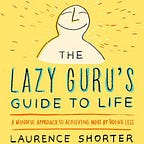Jumping into the void
Why the solution to everything is closer than you think
I’ve never properly understood the phrase ‘leap of faith’.
I’ve always assumed it refers to a daring jump into the unknown, like moving continent, proposing to someone you’re not sure about or taking a risky job in a distant land. But I’ve never been able to relate it to my life: If I don’t feel like something, I’ve learned it’s generally not a good idea to jump. On the other hand, if I do feel like doing something, it can’t really be described as an act of faith.
But today I got it. I was taking a walk around the park thinking about writing my blog, and I noticed an inner dread. It was an ‘oh f***’ feeling, like having to walk on stage with no clothes on — or the moment just before you ask someone out on a date. I knew I was going to have to jump, and there was no guarantee it would go well.
Leap of faith perfectly describes the moment between deciding to do something and doing it: between sitting down to write and writing, walking on stage and speaking or (original metaphor alert!) standing on a cliff and jumping off.
There’s an intermediary state between decision and action. And it’s a place I skip over all time because it’s so uncomfortable: It’s the part where I don’t have any idea. It comes before having an idea — you can’t avoid it.
This part — the void of not knowing — is the closest I come on a micro, day-to-day basis, to death itself. I can admit that there is a part of me that is deeply scared of that moment. It’s a quiet fear, subtle, just under the surface, but all the same a powerful one — so powerful that I mostly jump into action or distraction rather than walk into it — like doing emails for 3 hours instead of actually writing a proposal.
To be clear, this quiet inner gulp only happens when I don’t know the outcome and/or the way to get there. There is something uniquely intimidating (to me) about not knowing what to do. But if I am doing something habitual, like reaching for a supermarket trolley or brushing my teeth, there’s really not much space for existential dread. My guess is that it is still present somewhere in my system. It may even be the motive force behind my habits. The more I can automate my behaviour the more I can avoid the need for uncertainty.
Uncertainty is dreadful.
I’m pretty sure this fear is what Steven Pressfield refers to in his stirring book The War of Art as resistance, a life-long enemy we have to overcome every single day or fail (I also didn’t fully understand that idea until recently).
I bet that if I asked a dozen of the most accomplished actors, rock climbers, scientists, cooks, parents, chief execs, dancers and song writers if they knew what I was talking about, they would say:
“Yes, I totally know what you mean.”
I would also bet that many people would have no idea what I’m talking about because it’s such a subliminal, infinitesimally small thing — but they would all know plenty about procrastinating, which is the practical upshot of not taking the leap, of not walking into the unknown and daring to wait for the idea that inspires action.
Without inspiration — the embodied knowing that arises spontaneously when we are totally in the moment — our actions lack juice, spontaneity. Federer’s forehand may be highly automated, but that moment of grace that sends the ball sailing into the far left corner is anything but. Neither is it an accident. Inspiration is the source and the guarantor of effectiveness.
So why is leaping scary? Maybe it is a fear of extinction — the roadrunner moment of hanging over the empty void with nothing underneath to hold me up. Or else it’s the prospect of having to be a child again, knowing nothing, totally vulnerable.
Regardless of the reason, it’s there, and it is probably the most potent blocking force in my life. It’s always been there, but in the past distraction was easier. In the eery silence of our global freeze I am noticing that I’m being called on to face it more and more frequently, to get properly comfy with that place of not knowing.
It doesn’t take much to see this playing out on the global scale. When faced with uncertainty, people will do mad and dangerous things. But once they find the courage to leap into the unknown — gracefully, soundlessly — anything becomes possible. Everything. Or so it seems to me.
We may even find ourselves accessing the creativity we need so much in response to this crisis. Like most things in life, I can’t outsource this: Collective action is nothing but individual action writ large. Collective inventiveness is personal inventiveness accumulated. And a people’s courage in the face of crisis is no more than my personal willingness to face the unknown multiplied.
How we support each other in being with that space is the essence of inner work.
Good luck taking the leap.
